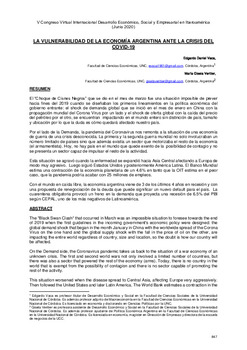| dc.contributor.author | Vaca, Edgardo Daniel | |
| dc.contributor.author | Veritier, María Gisela | |
| dc.date.accessioned | 2020-09-25T15:32:53Z | |
| dc.date.available | 2020-09-25T15:32:53Z | |
| dc.date.issued | 2020-06-16 | |
| dc.identifier.isbn | 978-84-122121-3-6 | |
| dc.identifier.uri | http://hdl.handle.net/11086/16287 | |
| dc.identifier.uri | https://www.eumed.net/actas/20/desarrollo-empresarial/57-la-vulnerabilidad-de-la-economia-argentina.pdf | |
| dc.description.abstract | El “Choque de Cisnes Negros” que se dio en el mes de marzo fue una situación imposible de prever hacia fines del 2019 cuando se diseñaban los primeros lineamientos en la política económica del gobierno entrante: el shock de demanda global que se inició en el mes de enero en China con la propagación mundial del Corona Virus por un lado y el shock de oferta global con la caída del precio del petróleo por el otro, se encuentran impactando en el mundo entero sin distinción de país, tamaño y ubicación por lo que la duda es cómo quedará afectado nuestro país.
Por el lado de la Demanda, la pandemia del Coronavirus nos remonta a la situación de una economía de guerra de una crisis desconocida. La primera y la segunda guerra mundial no solo involucraban un número limitado de países, sino que además existía un sector que motorizaba el resto de la economía (el armamentista). Hoy, no hay país en el mundo que quede exento de la posibilidad de contagio y no se presenta un sector capaz de impulsar el resto de la actividad.
Esta situación se agravó cuando la enfermedad se expandió hacia Asia Central afectando a Europa de modo muy agresivo. Luego siguió Estados Unidos y posteriormente América Latina. El Banco Mundial estima una contracción de la economía planetaria de un 4.6% en tanto que la OIT estima en el peor caso, que la pandemia podría acabar con 25 millones de empleos.
Con el mundo en caída libre, la economía argentina viene de 3 de los últimos 4 años en recesión y con una propuesta de renegociación de la deuda que puede significar un nuevo default para el país. La cuarentena obligatoria provocó un freno en la demanda que proyecta una recesión de 6.5% del PBI según CEPAL, uno de los más negativos de Latinoamérica. | es |
| dc.description.abstract | The "Black Swan Clash" that occurred in March was an impossible situation to foresee towards the end of 2019 when the first guidelines in the incoming government's economic policy were designed: the global demand shock that began in the month January in China with the worldwide spread of the Corona Virus on the one hand and the global supply shock with the fall in the price of oil on the other, are impacting the entire world regardless of country, size and location, so the doubt is how our country will be affected.
On the Demand side, the Coronavirus pandemic takes us back to the situation of a war economy of an unknown crisis. The first and second world wars not only involved a limited number of countries, but there was also a sector that powered the rest of the economy (arms). Today, there is no country in the world that is exempt from the possibility of contagion and there is no sector capable of promoting the rest of the activity.
This situation worsened when the disease spread to Central Asia, affecting Europe very aggressively. Then followed the United States and later Latin America. The World Bank estimates a contraction in the planetary economy of 4.6%, while the ILO estimates in the worst case, that the pandemic could end 25 million jobs.
With the world in free fall, the Argentine economy comes from 3 of the last 4 years in recession and with a proposal to renegotiate the debt that may mean a new default for the country. The mandatory quarantine caused a slowdown in demand that projects a recession of 6.5% of GDP according to ECLAC, one of the most negative in Latin America | en |
| dc.language.iso | spa | es |
| dc.relation.ispartof | https://www.eumed.net/actas/20/desarrollo-empresarial/desarrollo-empresarial.pdf | es |
| dc.rights | Attribution-NonCommercial-NoDerivatives 4.0 Internacional | * |
| dc.rights.uri | http://creativecommons.org/licenses/by-nc-nd/4.0/ | * |
| dc.subject | COVID-19 | es |
| dc.subject | Coronavirus | es |
| dc.subject | SARS-CoV-2 | es |
| dc.subject | Pandemia | es |
| dc.subject | Aislamiento social | es |
| dc.subject | Crecimiento económico | es |
| dc.subject | Inversiones | es |
| dc.subject | Empleo | es |
| dc.subject | Pobreza | es |
| dc.subject | Economic growth | es |
| dc.subject | Investments | es |
| dc.subject | Employment | es |
| dc.subject | Poverty | es |
| dc.subject | Cochrane | es |
| dc.title | La vulnerabilidad de la economía argentina ante la crisis del COVID-19 | es |
| dc.type | conferenceObject | es |
| dc.description.fil | Fil: Vaca, Edgardo Daniel. Universidad Nacional de Córdoba. Facultad de Ciencias Económicas; Argentina. | es |
| dc.description.fil | Fil: Veritier, María Gisela. Universidad Nacional de Córdoba. Facultad de Ciencias Económicas; Argentina. | es |






